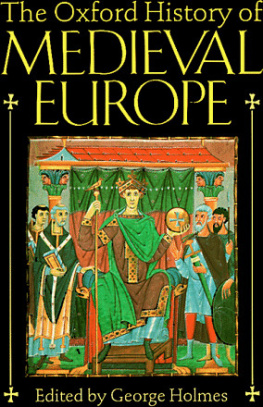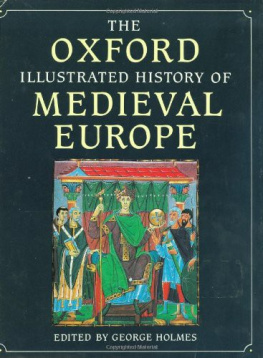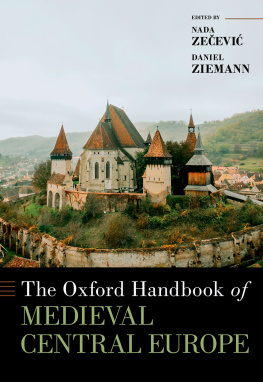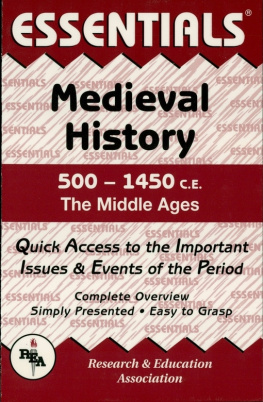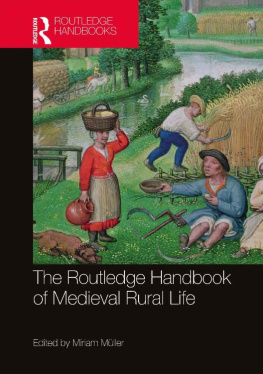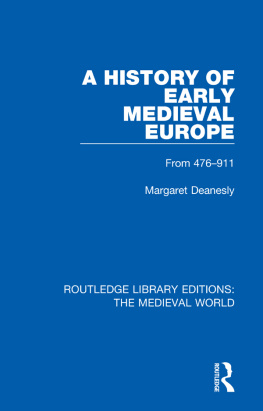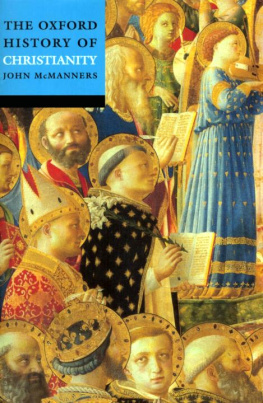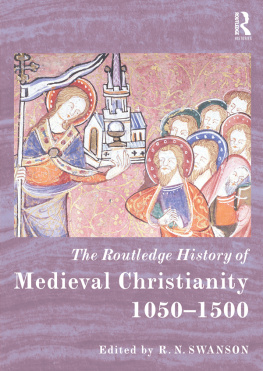GEORGE HOLMES is Chichele Professor of Medieval History and Fellow of All Souls College, Oxford. His previous books include (Past Masters, OUP, 1980), and Florence, Rome and the Origins of the Renaissance (OUP, 1986).
THE OXFORD HISTORY OF MEDIEVAL EUROPE
EDITED BY GEORGE HOLME
Oxford New York OXFORD UNIVERSITY PRESS
-iii-
Oxford University Press, Great Clarendon Street, Oxford OX2 6DP Oxford New York Athens Auckland Bangkok Bombay Calcutta Cape Town Dar es Salaam Delhi Florence Hong Kong Istanbul Karachi Kuala Lumpur Madras Madrid Melbourne Mexico City Nairobi Paris Singapore Taipei Tokyo Toronto Warsaw and associated companies in Berlin Ibadan
Oxford is a trade mark of Oxford University Press
Editor's Foreword and Postscript George Holmes 1988
The rest of this volume Oxford University Press 1988
The text of this edition first published 1988 in The Oxford Illustrated History of Medieval Europe This edition first issued as an Oxford University Press paperback 1992
All rights reserved. No part of this publication may be reproduced, stored in a retrieval system, or transmitted, in any form or by any means, without the prior permission in writing of Oxford University Press, Within the UK, exceptions are allowed in respect of any fair dealing for the purpose of research or private study, or criticism or review, as permitted under the Copyright, Designs and Patents Act, 1988, or in the case of reprographic reproduction in accordance with the terms of the licences issued by the Copyright Licensing Agency. Enquiries concerning reproduction outside these terms and in other countries should be sent ot the Rights Department, Oxford University Press, at the address above.
This book is sold subject to the condition that it shall not, by way of trade or otherwise, be lent, re-sold, hired out or otherwise circulated without the publisher's prior consent in any form of binding or cover other than that in which it is published and without a similar condition including this condition being imposed on the subsequent purchaser
British Library Cataloguing in Publication Data
Data available
Library of Congress Cataloging in Publication Data The Oxford history of medieval Europe / edited by George Holmes. p. cm.
Abridged ed. of : The Oxford illustrated history of medieval Europe.
Includes bibliographical references.
1. Europe--Etymology--476-1492. I. Holmes, George, 1927II. Title : Oxford illustrated history of medieval Europe. 940.1--dc20 D102.093 1992 91-43488
ISBN 0-19-285272-8
11 13 15 17 19 20 18 16 14 12
Printed in Great Britain by Cox & Wyman Ltd, Reading, Berkshire
-iv-
EDITOR'S FOREWORD
WESTERN civilization was created in medieval Europe. The forms of thought and action which we take for granted in modern Europe and America, which we have exported to other substantial portions of the globe, and from which indeed we cannot escape, were implanted in the mentalities of our ancestors in the struggles of the medieval centuries. Since 1500 our civilization has not had to endure any upheaval remotely comparable with the shattering and rebirth which accompanied the migrations and new institutions of the Dark Ages between 400 and 900. And, therefore, it has not seen any flowering of new ways of life and attitudes as fundamentally novel as those which grew up around the cathedrals and universities, the royal courts and the commercial cities in the centuries between 900 and 1500.
Most Europeans live in towns and villages which existed in the lifetime of St Thomas Aquinas, many of them in the shadow of churches already built in the thirteenth century. That simple physical identity is the mark of deeper continuities. The modern nation state grew out of the monarchies created by kings such as Philip Augustus of France and John of England. Democratic forms of government are based on the systems of representation and consent evolved in thirteenth-century parliaments. The idea of popular sovereignty emerges first in the writings of a fourteenth-century scholastic, Marsilius of Padua, who knew the communes of contemporary Italy. Our methods of commerce and banking are derived from the practices of the Florentine Peruzzi and Medici. Students work for degrees already awarded in the medieval universities of Paris and Oxford in courses which have gradually evolved out of those followed in the medieval faculties of arts. Our books of history and our novels are lineal descendants of the works of Leonardo Bruni and Giovanni Boccaccio. Our troubled sense of the distinction between the physical world of nature and the spiritual
-v-
world of religion and morals derives from the dualism of Aquinas's thirteenth century when popes and universities confronted kings and parliaments and the scholastics struggled to reconcile Aristotle and the Bible.
The rebirth of western civilization and continuity since that time are the reasons why the medieval world is supremely important if we want to understand our own origins. But it is the historian's business to describe the differences in the past, which are less easy to grasp than the similarities, and without which the shape and movement of an earlier society are unintelligible. David Whitton begins his chapter in this book with a description of the world of a great twelfth-century magnate, Henry the Lion, in which the importance of kinship relations and the claim to religious sanction mark a political system different from any that we can know today. Earlier in the book Edward James tells us about Rdwald and Dagobert in seventh-century East Anglia and Gaul, whose kingship was still more remote from modern governments. In other chapters we meet Cathars and Hussites whose medieval nonconformity has something in common with the piety we can meet today but in other respects is mysterious to us. To grasp the lineaments of a distant age we have to balance the similarities which arise from common humanity and a constant inheritance of ideas against the acute distinctions caused by differences of social structure and intellectual traditions. Medieval Europe is not as difficult for us to understand as ancient China or India but it presents a very substantial challenge to interpretation. The devotion of the medieval knight to a life of chivalric warfare and courtly intercourse or of a medieval hermit to a life of constant prayer and total seclusion presents us with ideals of conduct which we cannot easily understand.
The picture which we can now construct of the medieval world is based very largely on the researches and rethinking of the last hundred years. It is very different both from Gibbon's grand dismissal of superstition and from Scott's romantic attachment to Gothic glories. Our present vision of that world is based partly on the printing of vast quantities of medieval documents ranging in type from the narrative chronicles, in

